Jesse Root Grant
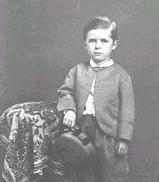
Here are the recollections of Jesse Root Grant (1858-1934), the youngest son of Ulysses S. Grant.
"He was very gentle and good..."
Hamlin Garland Papers, Doheny Library, University of Southern California
and
Grant, Jesse R. In the Days of My Father General Grant. New York: Harper, 1925.
My father was not a reformer naturally, although he believed things could be made better. He was not exactly conservative either, he always occupied a middle ground. He had no superstitious regard for the past or for things as they were. He was ready to change when his judgment was convinced that change was necessary for the good of the people. He was not a pious man and when anyone tells you about having a religious conversation with father, they lie.
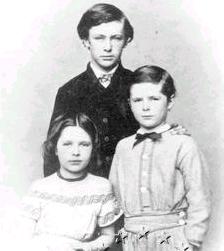 Jesse (right) in 1866 with U.S. Grant, Jr. and Nellie Jesse (right) in 1866 with U.S. Grant, Jr. and Nellie
He was a man who had given some thought to religious matters, and had come to the conclusion that they were beyond human solution. And therefore, he bothered himself very little about the question of immortality of the soul and things like that. He believed Christianity to be a good thing, and so were all the other religions of the world. Each had its place, and each would be found on the other side of death, or else nobody at all would be there. He was probably what would be called a pure agnostic. I never heard him talk about religion.
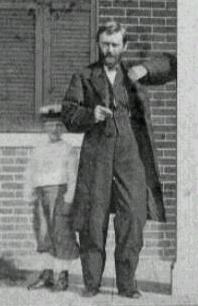 Jesse at the age of 7 with his father in Galena Jesse at the age of 7 with his father in Galena
Yes, Bishop Newman baptized father at mother's request when he was unconscious. As soon as he came to himself and looked around, he said, 'What's the matter? What is all this excitement?' Mother told him that she had asked Bishop Newman to baptize him, and that he had done so. Father then said, very gently, 'I am surprised,' or 'you surprise me.' He showed that he was both annoyed and indignant, but he said no more about it. It was done and could not be helped. He saw that mother had taken this last precaution and that it pleased her, so he let it go. I never heard him use a pious expression. If he asked us not to play billiards on Sunday, he did so because he was afraid it would hurt somebody's feelings - not because he cared or because of any religious scruples. He would have refused to play cards on Saturday in a Jewish community on the same grounds. He was always deeply considerate of others.
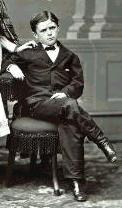 Jesse in 1869 at the age of 12 Jesse in 1869 at the age of 12
In my memory of him, and his record, father's uncompromising patriotism, his absolute, self-sacrificing loyalty, stand out as his dominant characteristics; right or wrong, his country came first and he supported it with all that he had. In all my vivid memory of our life together, there is no recollections of one single unkind, unfair, or unjust thing done to me by any one of the family, while the record of their loving acts would cover every day of our association.
I remember leaving Vicksburg with regret, but one experience of that period stands out in painful memory. There was a dinner - I believe, at Columbia, Kentucky, and I was assigned to the second table, with the children. To a child fresh from the enthusiastic attention of an army, the disregard and utter lack of consideration conveyed in being thus set aside quite upset my equanimity.
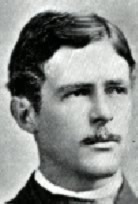 Jesse at the age of 24 Jesse at the age of 24
My nurse, Julia, a slave of my mother's, was utterly unable to cope with me and appealed for aid to my mother, who, in turn, found matters beyond her control and called father. Father quickly grasped the state of affairs and turned to me sternly - the only time I ever remember him being stern with me. 'Sit down!' said he. I sat. I had crowded my hat upon my head. 'Take off that hat!' I grabbed the hat and threw it upon the floor. 'Pick up that hat!' continued the strangely stern voice. But I was quite desperate now and stubbornly refused. Turning me quickly about, my father bestowed a single spank, the first and only one he ever administered to me. 'It didn't hurt,' I muttered scornfully. This was too much for father. Lifting me up in his arms, he said, gently, 'Never mind, son. It was really a great mistake for the Governor or Kentucky to expect a man of your size to dine with children.'
At City Point, in 1865, I first met President Lincoln. Father was but 42 years of age then, and I had always looked upon him as the largest, and next to my Grandfather Dent, the oldest man in the world. But beside Lincoln, father looked small and for the first time I saw him as a young man. He decided that he would like to keep me with him for the rest of the winter (1864-5) . I was overjoyed. But when the rest of the family departed... I grew doubtful. A few minutes later, I found father fully occupied and I capitulated. Father understood, as he always did. His was ever the most sympathetic comprehension. He would have kept me with him from choice. No matter how great the strain and responsibility of his position, it troubled father more to be entirely separated from his family.
 Jesse in 1885 Jesse in 1885
Father has been criticized for his loyalty to his subordinates. Perhaps this loyalty was, at times, imposed upon. It was part of the man. Where he believed he would not question, and he did not readily credit evil report. It required more than apparent facts to convince him, for behind the facts he sought to know and understand the equities. But when he gave an order he considered the thing done. That was the commander. There was no excuse for disobedience. He was unusually quiet and restrained, but alert, and with a curious suggestion of reserve power about him that made his unhurried movements more forceful that the more violent action of another.
Never in his life had father made an effort to secure either military or political advancement. He entered West Point reluctantly and he served faithfully and as long as the opportunity for active service continued. Then he stepped aside. Again, when the call came, he offered himself and he served until the need was past. He never sought to advance himself, he sought only for the opportunity to serve. He was brave, honest, patriotic, as abstemious as self-contained, a man without guile.
The love of my parents for each other and their devotion to us children made no impression on me then. I had never known anything different. Appreciation and understanding come to me now, filling me content. Whatever the storm and stress, the anxieties and the disappointments, they knew happiness. In all my life I never saw one instance of misunderstanding or friction between them; nothing but abiding faith and love in full content in each other.
He was a quiet, contained man, in elation or disappointment he only grew a little quieter. He was incapable of sustained animosity, even toward his detractors. He was a very lovely character - very gentle and good. As I grew older, I came to understanding of my father's sentiments before he expressed them and when to another his face gave no indication of his purpose or feelings; and always his words or his act confirmed my understandings. I am my father's son and we were close. I know.
|


